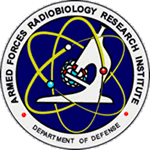Armed Forces Radiobiology Research Institute: Difference between revisions
ClueBot NG (talk | contribs) m Reverting possible vandalism by 165.230.224.232 to version by Boundarylayer. Report False Positive? Thanks, ClueBot NG. (2925746) (Bot) |
Rescuing 1 sources and tagging 0 as dead. #IABot (v1.4) |
||
| Line 24: | Line 24: | ||
==External links== |
==External links== |
||
* [http://www.usuhs.mil/afrri/ Armed Forces Radiobiology Research Institute website] |
* [http://www.usuhs.mil/afrri/ Armed Forces Radiobiology Research Institute website] |
||
* [http://www.afrri.usuhs.mil/outreach/reports/pdf/SP86-2.pdf DoD Mishaps] |
* [https://web.archive.org/web/20081218233551/http://www.afrri.usuhs.mil/outreach/reports/pdf/SP86-2.pdf DoD Mishaps] |
||
[[Category:Radiobiology]] |
[[Category:Radiobiology]] |
||
Revision as of 06:57, 9 July 2017

The Armed Forces Radiobiology Research Institute (AFRRI) is a triservice laboratory in Bethesda, Maryland, USA, and was chartered by the U.S. Congress in 1961. It conducts research in the field of radiobiology and related matters which are essential to the operational and medical support of the U.S. Department of Defense (DoD) and the U.S. military services. AFRRI provides services and performs cooperative research with other federal and civilian agencies and institutions.
Organization
AFRRI is a joint entity of the military departments and is subject to the authority and direction of the president of the Uniformed Services University of the Health Sciences (USU), under the assistant secretary of defense for health affairs and the under secretary of defense for personnel and readiness.
Program
AFRRI is charged with executing DoD's Medical Radiological Defense Research Program. Its civilian and active duty military personnel conduct exploratory and developmental research to identify and develop medical countermeasures against ionizing radiation. Core areas of study include prevention, assessment, and treatment of radiological injuries. The program seeks to develop prophylactic and therapeutic drugs, such as Ex-Rad, that prevent and treat radiation injuries and to develop rapid high-precision analytical methods that assess radiation exposure doses from clinical samples and thus aid in the triage and medical management of radiological casualties. New drug candidates and biological dose assessment technologies are developed up to and through preclinical testing and evaluation.
Responsibilities
- Operate research facilities for and disseminate results from the study of radiobiology and ionizing radiation bioeffects and the development of medical countermeasures against ionizing radiation.
- Provide analysis, study, and consultation on the impact of the biological effects of ionizing radiation on the organizational efficiency of the U.S. military services and their members.
- Conduct cooperative research with military medical departments in those aspects of military and operational and medical support considerations related to nuclear weapons effects and the radiobiological hazards of space operations.
- Conduct advanced training in the field of radiobiology and the biological effects of nuclear and radiobiological weapons to meet the internal requirements of AFRRI, the military services, and other DoD components and organizations.
- Participate in cooperative research and other enterprises, consistent with the AFRRI mission and applicable authorities, with other federal agencies involved in homeland security and emergency medical preparedness.
Awards
AFRRI was awarded the Meritorious Unit Commendation in 2004.
